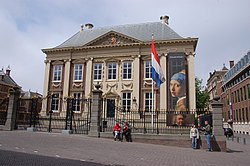Mauritshuis

Mauritshuis in 2005
|
|
|
Location in South Holland in the Netherlands
|
|
| Established | 1822 |
|---|---|
| Location |
Plein 29 The Hague, Netherlands |
| Coordinates | 52°04′50″N 4°18′52″E / 52.080556°N 4.314444°ECoordinates: 52°04′50″N 4°18′52″E / 52.080556°N 4.314444°E |
| Type | Art museum |
| Collection size | 841 objects |
| Visitors | 322,000 (2014) |
| Director | Emilie E. S. Gordenker |
| President | A. R. Wynaendts |
| Website | www |
The Mauritshuis (Dutch pronunciation: [ˈmʌurɪtsɦœys]; English: Maurice House) is an art museum in The Hague in the Netherlands. The museum houses the Royal Cabinet of Paintings which consists of 841 objects, mostly Dutch Golden Age paintings. The collections contains works by Johannes Vermeer, Rembrandt van Rijn, Jan Steen, Paulus Potter, Frans Hals, Jacob van Ruisdael, Hans Holbein the Younger, and others. Originally, the 17th century building was the residence of count John Maurice of Nassau. It is now the property of the government of the Netherlands and is listed in the top 100 Dutch heritage sites.
In 1631, John Maurice, Prince of Nassau-Siegen, a cousin of stadtholder Frederick Henry, bought a plot bordering the Binnenhof and the adjacent Hofvijver pond in The Hague, at that time the political centre of the Dutch Republic. On the plot, the Mauritshuis was built between 1636 and 1641, during John Maurice's governorship of Dutch Brazil. The Dutch Classicist building was designed by the Dutch architects Jacob van Campen and Pieter Post. The two-storey building is strictly symmetrical and contained four apartments and a great hall. Each apartment was designed with an antechamber, a chamber, a cabinet, and a cloakroom. Originally, the building had a cupola, which was destroyed in a fire in 1704.
...
Wikipedia

